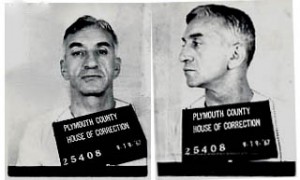The animating idea of The Strangler was to recreate Strangler-era Boston, to bring the lost city to life so convincingly that readers would have the immersive three-dimensional experience of actually being there, walking the streets, brushing shoulders with the people. Period authenticity was important: the original working title of the book was The Year of the Strangler.
Of course reanimating the actual city required that a few prominent Bostonians appear undisguised, or nearly so, including gangsters, cops, and politicians. In the original draft, these characters were accurately named and described. The mob boss Capobianco, for example, was called by his real name, Gennaro Angiulo. The historical Gerry Angiulo ran the Boston mob during my childhood in the 1970s. In 1963 and ’64, when The Strangler takes place, he was just consolidating his power.

On the eve of the book’s publication, I got a call from a lawyer at Random House asking about some of these historical figures, including Angiulo. “Is he still alive?” the lawyer wanted to know. Apparently libel laws are stricter when the subject is living. Angiulo was 87 years old then, but still alive in a federal prison. So his name had to be changed. To further insulate the book from a libel charge, Angiulo had to be mentioned by name in the book so we could plausibly deny that my character Capobianco was an Angiulo stand-in. After all, we could argue, there is Angiulo standing next to Capobianco — how could they be the same person? All this sensitivity about the man’s reputation seemed a little ridiculous to me. How was it possible to libel a murderer and convicted mafioso like Gerry Angiulo? But I did not insist, and shortly before publication the character was rechristened Charlie Capobianco. Still the facts remain: the novel’s description of a “born bookie” who became a mob boss — his physical appearance, his biography, his North End headquarters, his bookmaking operation — all are meticulously faithful to the life of Gerry Angiulo. (The libel issue is moot now. Gerry Angiulo died at the end of August, at age 90. His funeral procession required a flatbed truck to carry the 190 bouquets of flowers.)
[Read more…] about Angiulo, Barboza and fictionalizing the Boston Mob